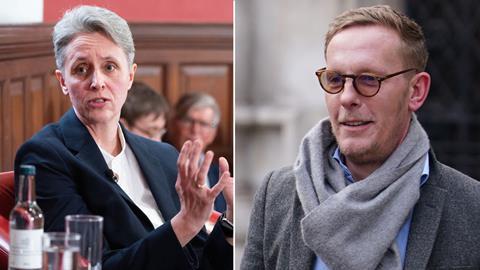Free speech protects great minds discussing ideas, not small minds abusing people, says George Pitcher, as he looks at the recent cases of Laurence Fox and Kathleen Stock

Eleanor Roosevelt is supposed to have said that “great minds discuss ideas; average minds discuss events; small minds discuss people.” The verb “discuss” is doing a good deal of heavy-lifting here, but this week has provided two perfect examples of minds at both ends of the gene pool.
The Roosevelt rule
At the shallow end of that pool, we have an actor, Laurence Fox, who has taken on the tough role of contrarian politico-activist, in which it would only be polite to say he is far from convincing. At the deep end, we have Professor Kathleen Stock, whose hounding from her post in 2021 over expressed transgender and gender identification views has caused the academic regulator to fine the University of Sussex close to £600,000.
We needn’t dwell on the unfantastic Mr Fox. It’s in the nature of small minds to believe they’re playing in the deep end, discussing ideas, when in reality they are simply attacking people. Thus he has been charged with a sexual offence by publishing a tawdry “upskirting image” of TV presenter Narinder Kaur. He has form in this regard, he isn’t big, he isn’t clever and he needs to be taken back indoors until he learns to behave.
By contrast, Prof Stock does discuss ideas as part of her academic endeavour and, oddly enough, discusses ideas of gender with which Mr Fox may agree. The difference is, so far as one can tell, that she is not attacking individuals. It appears that the university regulator has agreed with that conclusion.
Protecting people…and their opinions
What’s rather pleasing about comparing these two cases is that in law (notwithstanding that the evidence has yet to be heard in court) Ms Kaur has a right to be protected from someone who attacks her sexually online, while equally Prof Stock has a right to be protected from those who would take her down for expressing her views on gender.
Quite clearly, the latter is a freedom of speech issue, just as the former most certainly isn’t.
Clearly, an attack or censure of a religion or culture is of a different order than an attack on individuals who are members of them.
The comparison between these two legal actions perfectly illustrates that freedom of speech can be restricted when it threatens individuals, but not when it threatens opinions. Prof Stock may or may not be “transphobic” but she holds an inalienable right to express views that transgender people may find offensive, whether she intends to or not. Conversely, Mr Fox has no right to publish physically intrusive images of Ms Kaur that she calls “unimaginably mortifying”, because a sexual offence is beyond simply offensive – it’s an assault.
Religion and the boundaries of criticism
This is, I think, a helpful distinction for freedom of speech, between assault on the person and an attack on a concept, an idea or even a culture that some might find offensive. I have a particular interest in how this principle might be applied to religion. Clearly, an attack or censure of a religion or culture is of a different order than an attack on individuals who are members of them.
Distinguishing between the two kinds is often testing. Censure of Israel’s policy of extreme aggression in Palestine, for example, is often though not invariably veiled antisemitism. We need thoroughly to distinguish between the two. Yet, we can still say that an attack on a person for being a Jew is intolerable in any circumstance, while censure of Benjamin Netanyahu’s assault on Gaza is not.
Furthermore, to call out antisemitism is to shine the harshest of light on it, from which we all too often shy away for fear of illuminating the beasts from its history. The idea of antisemitism should be discussed openly. Allow antisemites free speech and we can see how empty is their locker – maybe a few out of print copies of The Protocols of the Elders of Zion and some slack-jawed skinheads claiming “the Jews run everything”. To echo Mrs Roosevelt, these are small minds discussing people, not great minds discussing ideas.
Same with Islamophobia. Let small minds claim we’re the subject of a “takeover”. Then ask them if they know the proportion of the UK population that is Jewish or Muslim. It’s 0.5 per cent for the former (a little over quarter of a million people) and six per cent for the latter (fewer than four million). Try organising an international conspiracy, Great Replacement or insurrection with these numbers.
“Great minds discuss ideas; average minds discuss events; small minds discuss people.”
God knows Christians are persecuted dreadfully in some parts of the world. But not here. When Lord Falconer, in support of the Assisted Dying Bill, tells people of faith (Christian or Muslim) that their views don’t matter, that’s a spurious attack on the idea of democracy and should be openly debated (he’d lose), not taken as an offence.
Ideas, as well as democracy, die in darkness. We should distinguish between great minds discussing ideas and small minds abusing people. The former shed light, the latter only dark.





































3 Readers' comments